Berlin was voted to host the 1936 Olympic Games in 1931, before the Nazi Party came to power in Germany. Proposed boycotts of the Berlin Olympics arose in many Western countries, who were appalled by Germany’s racist policies and human rights violations. Still, 49 countries attended the games in Berlin, the most countries to attend an Olympiad up to that date. The German government used the international spotlight as an opportunity to portray the country as a benign and progressive nation while also providing fuel for its Aryan-superiority propaganda, the latter of which the IOC specifically prohibited. The 1936 Berlin Olympics Games and the controversy of American participation in those games was the first of the so-called political Olympics games. For Hitler, the 1936 games were a pageant for Nazi propaganda. The United States and the world had an opportunity to stand up against Hitler’s Germany and boycott the games. Why didn’t they?
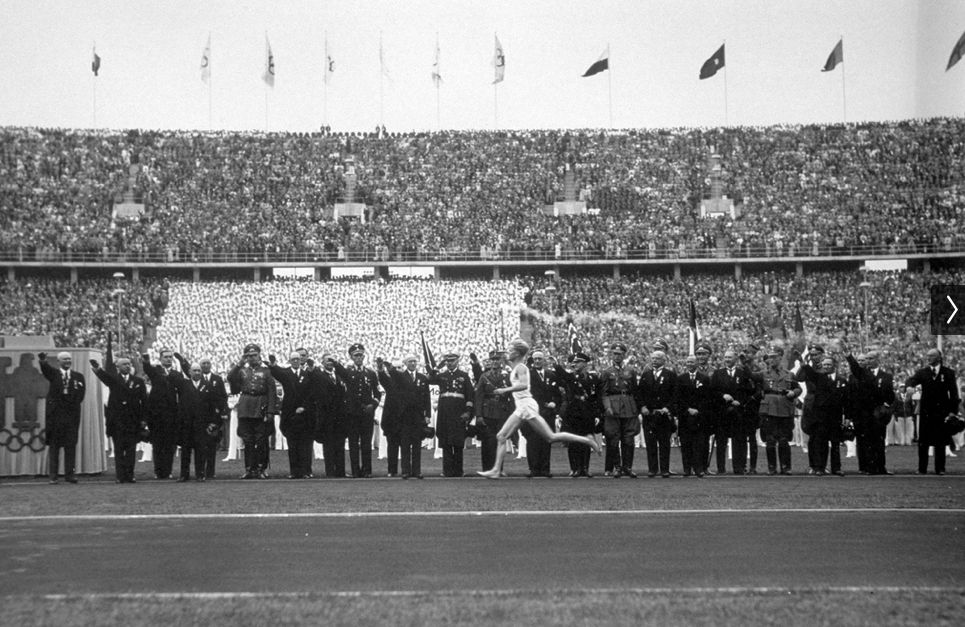 The Olympic Torch is carried into the stadium to begin the 1936 Games (Central Press/Getty Images)
The Olympic Torch is carried into the stadium to begin the 1936 Games (Central Press/Getty Images)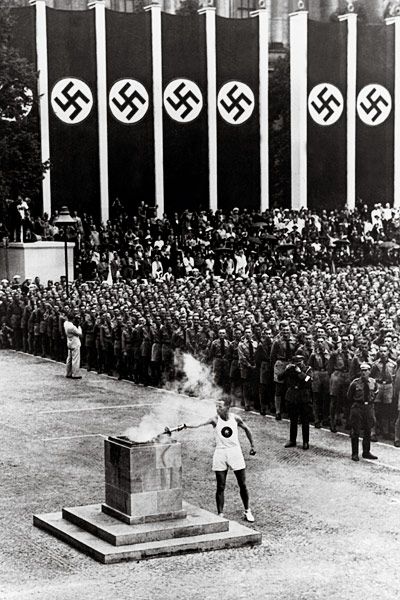
The Olympic Torch is lit to kick of the 1936 Olympic Games, an event meant to showcase the Nazi regime (WGN Radio)
For a year, American athletic organizations debated boycotting the Berlin Olympics in response to the treatment of Jewish people in Germany and Austria. In a formal vote in 1935, the Amateur Athletic Union narrowly rejected a boycott resolution. The American Olympic Committee, headed by Avery Brundage, encouraged American athletes to participate. This encouragement, in turn, legitimized the Hitler regime and was seen by some, including the Washington Post, as wasting an opportunity, “to let the Germans see what the outside world thinks of their present ruler.” Avery Brundage opposed the boycott, arguing that politics had no place in sports. What was President Franklin D. Roosevelt’s view on boycotting the 1936 Berlin games? FDR did not get involved in the boycott issue, despite protests from high level American diplomats within his administration. Both the U.S. ambassador to Germany, William E. Dodd, and George Messersmith, head of the U.S. Legation in Vienna, deplored the American Olympic Committee’s decision to go to Berlin. In choosing not to involve himself in the boycott issue, Roosevelt followed a 40-year tradition in which the American Olympic Committee operated independently of outside influence.
 The June 4, 1934 Issue of the New York Times outlined Avery Brundage's views on boycotting the 1936 Games (rarenewspapers.com)
The June 4, 1934 Issue of the New York Times outlined Avery Brundage's views on boycotting the 1936 Games (rarenewspapers.com)There were short-lived boycott efforts that surfaced in Great Britain, France, Sweden, Czechoslovakia, and the Netherlands. Additionally, German Socialists and Communists in exile voiced their opposition to the games through publications such as Arbeiter Illustrierte Zeitung (The Worker Illustrated Newspaper). Debate over the participation in the 1936 games in the United States was fierce. Some athletes wanted to go to show the best way to beat the Nazis was in the Olympic arena. Others thought US participation would equate an endorsement of the Third Reich. Ultimately, the boycott movement failed in the United States. Some boycott proponents supported a “counter Olympics.” One of the largest was the “People’s Olympiad” planned for summer 1936 in Barcelona, Spain. It was cancelled after the outbreak of the Spanish Civil War in July 1936, just as thousands of athletes had begun to arrive.
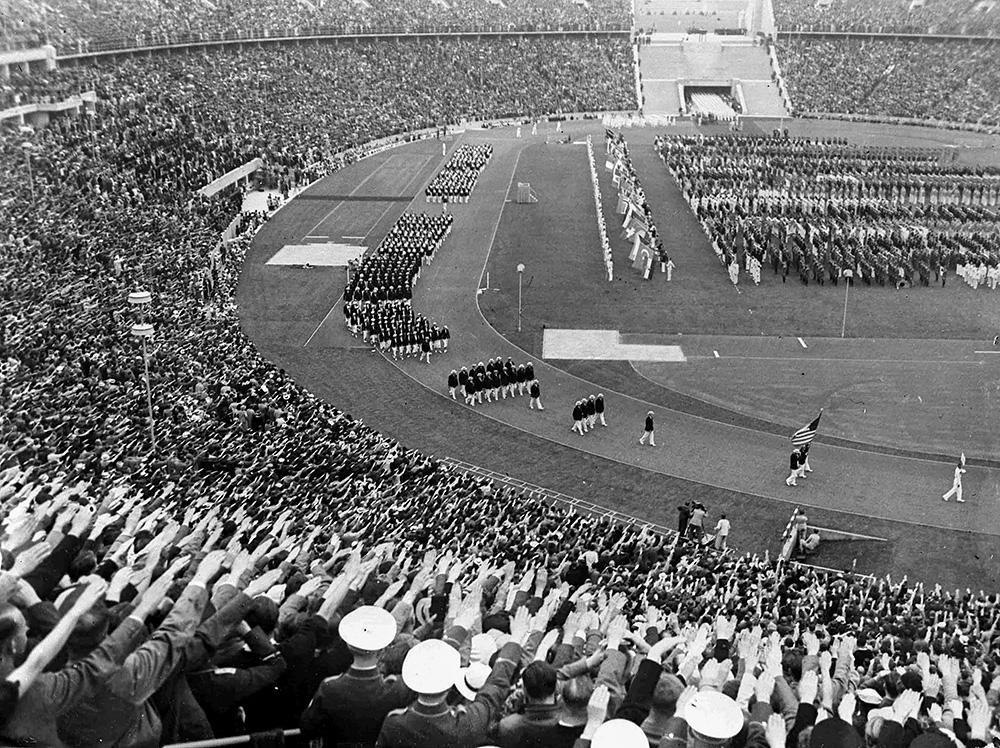 Team USA entering the Olympic stadium (scoopnest.com)
Team USA entering the Olympic stadium (scoopnest.com)The Games were not without controversy for another reason as well. Though the IOC required that Germany accept qualified Jewish athletes to represescoopnest.comnt them in Berlin, Jewish-American athletes Marty Glickman and Sam Stoller were denied from running the 400-meter relay by the American Olympic Committee (AOC). Many believed that the AOC did not want to offend Hitler and were outraged that Glickman and Stoller were not allowed to participate in the Games. The two were replaced by Jesse Owens and Ralph Metcalfe.
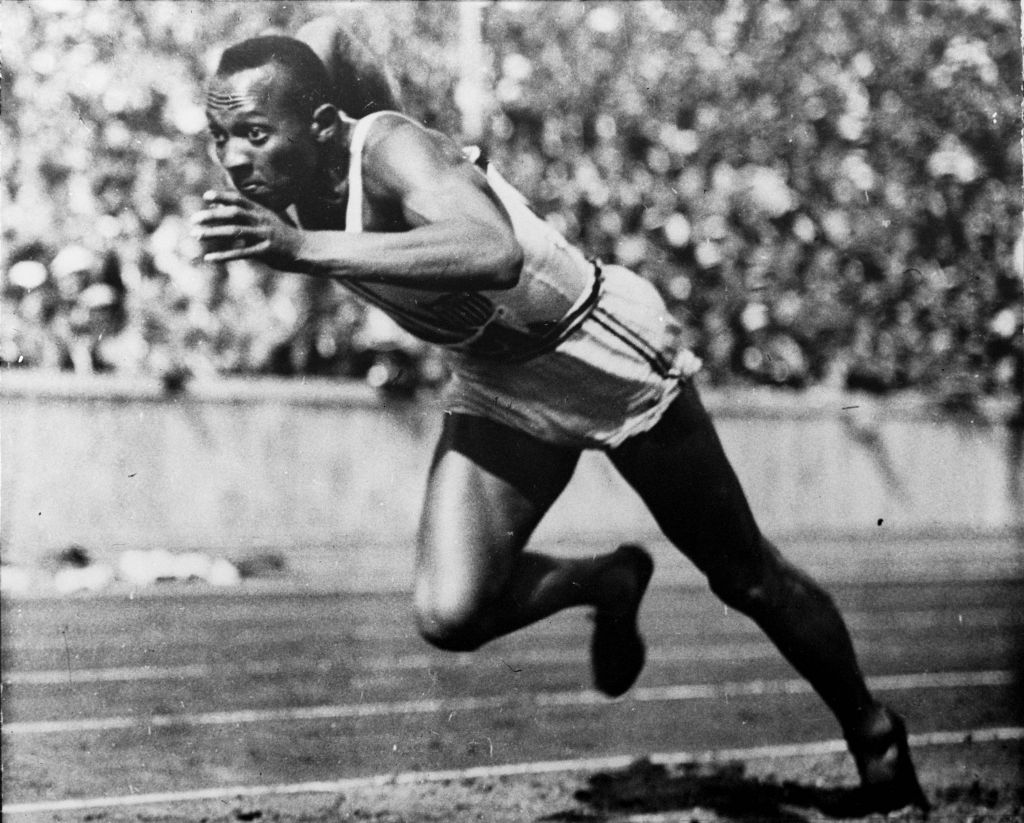 Olympic champion, Jesse Owens (AP Photo File)
Olympic champion, Jesse Owens (AP Photo File)Record breaking American sprinter and long jumper Jesse Owens, an African American, won four gold medals, and in essence, destroyed any attempt Germany had at proving white supremacy through the Games. Hitler reportedly, only shook hands with German and Finnish medalist winners, leading many to believe that he snubbed Owens in the wake of his historic victories. Years later, Owens recalled that the two had only “exchanged congratulatory waves”. But Owens felt more neglected by FDR than Hitler, saying, “that the president didn’t even send a telegram” or publicly acknowledge him or any of the 18 African Americans who competed in Berlin. Eighty years later, President Obama met with the families of the African American athletes who competed at the 1936 Olympic Games in Berlin and offered praise. President Obama said: “It wasn’t just Jesse. It was other African Americans athletes in the middle of Nazi Germany under the gaze of Adolf Hitler that put a lie to notions of racial superiority-whooped’em- and taught them a thing or two about democracy and taught them a thing or two about the American character.”
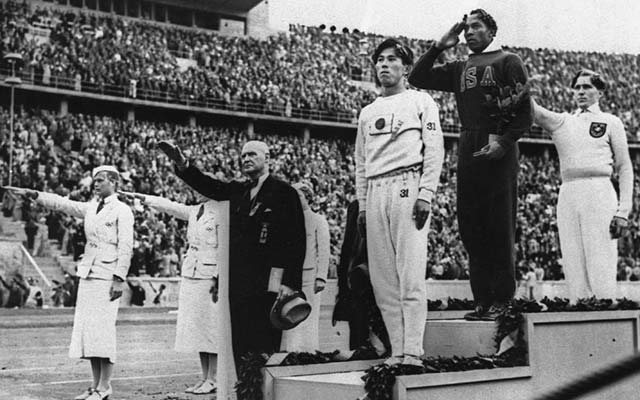 Jesse Owens on the Olympic Podium (Reddit)
Jesse Owens on the Olympic Podium (Reddit)An event that spurred much controversy, the 1936 Olympic Games were a place where sports and politics intersected on the eve of one of the world’s most significant conflicts.
Sources:
Freedom from Fear: The American People in Depression and War 1929-1945 by David Kennedy.
"The Movement to Boycott the Berlin Olympic Games,1936", the Holocaust Encyclopedia.
"Berlin, 1936: At the Olympics, Achievements of the Brave Year of Cowardice." Shirley Povich. Washington Post, July 6, 1996.
"7 Significant Political Events at the Olympic Games." By Cydney Grannan. Encyclopedia Britannica.
"A White House Tribute at Last." By Marina Koren. The Atlantic.
